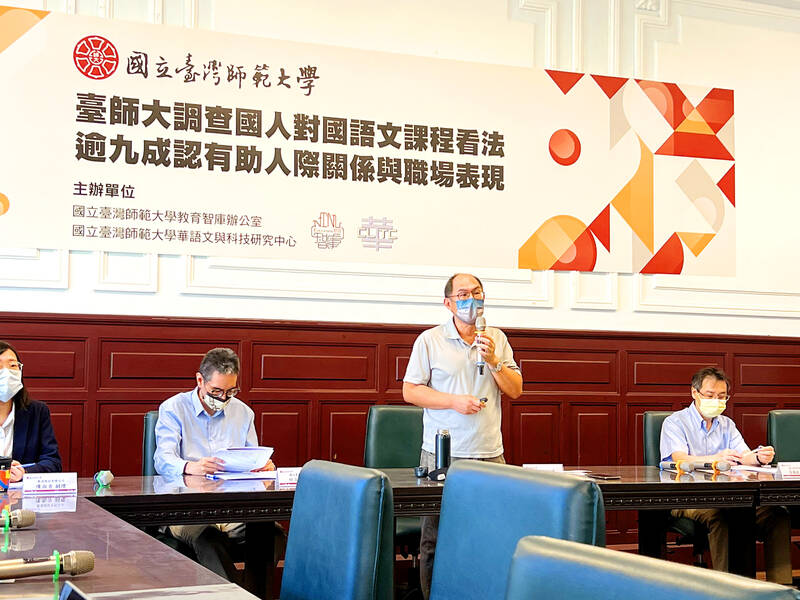More than 90 percent of Taiwanese consider learning Mandarin helpful for work and interpersonal relationships, a survey released by National Taiwan Normal University’s (NTNU) Chinese Language and Technology Center showed.
The survey, conducted on Tuesday and Wednesday, collected 1,092 valid samples from Taiwanese aged 21 to 60, the center said on Thursday.
The study also used news reports on classical Chinese education posted on Professional Technology Temple (PTT), the nation’s largest online bulletin board system, it added.

Photo: CNA
The survey was publicized after an announcement by the University Admission Committee last month that subjects of the General Scholastic Ability Test are to be included in each university department’s admission criteria.
The test consists of six subjects: Mandarin, English, category A mathematics, category B mathematics, social sciences and the sciences.
However, some universities — including a number of engineering departments at National Taiwan University — have decided to exclude applicant scores for Mandarin when considering their qualifications.
The project’s principal investigator, Chung Chung-hsien (鍾宗憲), who is also a professor at NTNU’s Department of Chinese, said on Thursday that the Mandarin language topic has generated a lot of discussion.
Mandarin courses are often criticized as being conservative, especially as electronic devices have altered the function of language and how people interact, he said, adding that opinions for and against Mandarin courses exist.
The survey found that 76 percent of respondents considered Mandarin lessons “very good” or “good”; while 82.7 percent of respondents thought that Mandarin teachers were “very good” or “good,” he said.
Furthermore, 91.7 percent, 88.5 percent and 91.8 percent of the respondents thought that Mandarin courses had a good influence on career, life planning and interpersonal relationships respectively, he said.
One of the major goals of Mandarin courses is to facilitate communication by teaching the essence of the language, he said.
Respondents over the age of 30 highly supported Mandarin lessons, indicating that teaching materials containing a large proportion of classical Chinese, familiar to people in that age group’s school curriculum, do not hinder the ability to learn and apply the language, he said.
His comment alluded to the Ministry of Education’s curriculum review committee decision in 2017 to reduce the proportion of classical Chinese content in senior-high schools to between 35 percent and 45 percent from between 45 percent and 65 percent; the change took effect in 2019.
NTNU Department of Chinese professor Hsu Kuo-neng (徐國能) said that departments can only consider scores of four subjects as their admission criteria, so a trade-off would be inevitable.
However, some departments initially decided to exclude Mandarin, but later included it back in their assessment criteria, he said.
Language education is related to students’ adaptability, competitiveness and quality of life, so should be reconsidered and adjusted, he said.

WANG RELEASED: A police investigation showed that an organized crime group allegedly taught their clients how to pretend to be sick during medical exams Actor Darren Wang (王大陸) and 11 others were released on bail yesterday, after being questioned for allegedly dodging compulsory military service or forging documents to help others avoid serving. Wang, 33, was catapulted into stardom for his role in the coming-of-age film Our Times (我的少女時代). Lately, he has been focusing on developing his entertainment career in China. The New Taipei District Prosecutors’ Office last month began investigating an organized crime group that is allegedly helping men dodge compulsory military service using falsified documents. Police in New Taipei City Yonghe Precinct at the end of last month arrested the main suspect,

A cat named Mikan (蜜柑) has brought in revenue of more than NT$10 million (US$305,390) for the Kaohsiung MRT last year. Mikan, born on April 4, 2020, was a stray cat before being adopted by personnel of Kaohsiung MRT’s Ciaotou Sugar Refinery Station. Mikan was named after a Japanese term for mandarin orange due to his color and because he looks like an orange when curled up. He was named “station master” of Ciaotou Sugar Refinery Station in September 2020, and has since become famous. With Kaohsiung MRT’s branding, along with the release of a set of cultural and creative products, station master Mikan

Eleven people, including actor Darren Wang (王大陸), were taken into custody today for questioning regarding the evasion of compulsory military service and document forgery, the New Taipei District Prosecutors’ Office said. Eight of the people, including Wang, are suspected of evading military service, while three are suspected of forging medical documents to assist them, the report said. They are all being questioned by police and would later be transferred to the prosecutors’ office for further investigation. Three men surnamed Lee (李), Chang (張) and Lin (林) are suspected of improperly assisting conscripts in changing their military classification from “stand-by

LITTORAL REGIMENTS: The US Marine Corps is transitioning to an ‘island hopping’ strategy to counterattack Beijing’s area denial strategy The US Marine Corps (USMC) has introduced new anti-drone systems to bolster air defense in the Pacific island chain amid growing Chinese military influence in the region, The Telegraph reported on Sunday. The new Marine Air Defense Integrated System (MADIS) Mk 1 is being developed to counter “the growing menace of unmanned aerial systems,” it cited the Marine Corps as saying. China has constructed a powerful defense mechanism in the Pacific Ocean west of the first island chain by deploying weapons such as rockets, submarines and anti-ship missiles — which is part of its anti-access/area denial (A2/AD) strategy against adversaries — the